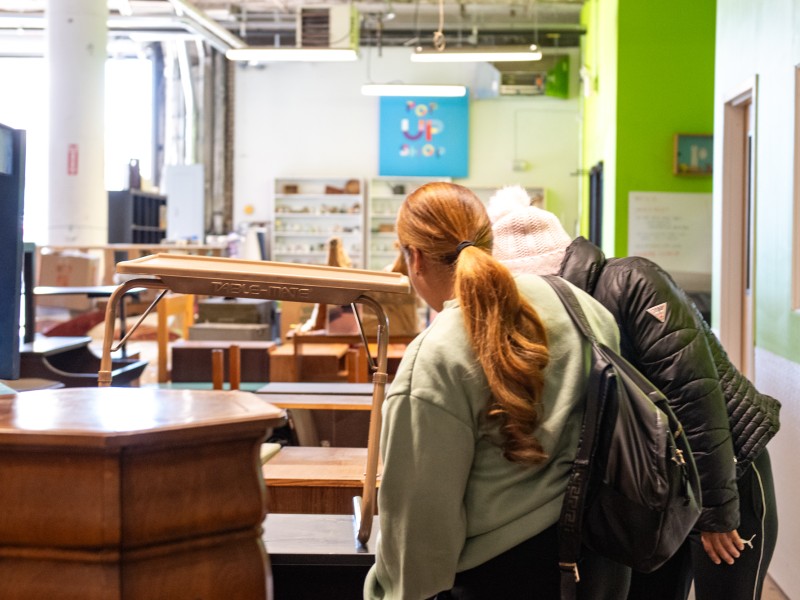It's Chris's calling, and she never looked back.
The first thing you're likely to notice about Pathways' CEO, Chris Simiriglia, is her incredible energy. Don't let her beautiful flower garden deceive you; between starting Pathways to Housing PA in 2008 and the Philadelphia Furniture Bank in 2014, she doesn't have much free time.
If you chat a while, you'll realize she's a problem solver, "chronically responsible" some friends have called it; driven to make things better. That's part of what drew her to Housing First, and it's why the Furniture Bank exists.
The third thing you should know, the thing you have to understand to truly know this woman, is that once she realized how hard life is on the streets, she recognized her calling and never looked back.
“I started working with people who were homeless many, many, many years ago,” Chris recalls. “I did outreach for the Philadelphia Committee to End Homelessness one night a week. Well,” she laughs, “One night a week, and then two, and then weekends. I was driving my family nuts missing holidays, but…it just felt like where I was supposed to be.”
Chris was only 17, a freshman at St. Joseph's University, when she started volunteering. That turned into an administrative job which quickly turned into an assistant director role at the Office of Homeless Services. In the mid-eighties, Chris ran the Outreach Coordination Center for Project HOME.
In 1994, Chris began working for the Mental Health Association. "Most of what I know about human services I learned during my 15 years there," she says. Chris oversaw programs that were struggling, nursing them back to health. Eventually, she became the Vice President and managed 48 programs across 5 counties.
In 2008, something changed. For years, homeless services had been run with the mindset that people had to prove they were ready before they could be permanently housed. But that year the Department of Behavioral Health and the Office of Homeless Services were looking at a new model call Housing First, which moved people with serious mental illness directly from the streets into their own apartments. "The city wanted to start a housing first program here, and I was asked to run it," Chris says.
For the first time, Chris had the chance to build something from the ground up. “I wanted to create an environment that would help people to be kind,” she recalls. Her years of working in direct service taught her what a difference little things could make. “I wanted art on the walls and coffee service for our participants. I wanted food for early morning meetings, and the freedom to pay someone’s electric bill if that’s what they needed.”
The fledgling program began in a single room, with just a few employees and some desks. It quickly grew, housing individuals with severe mental illnesses and long histories on the streets. "Some of our first participants had lived outside for 20 or 30 years," says Housing Director John Lambert, who came on shortly after the program started. By 2015, Pathways had five teams each serving 60 to 80 individuals.
In 2014, it was time to solve a new problem. "For years people across the city had been talking about the need for a furniture bank," Chris recalls. At the time, each agency was buying and storing their own furniture, which was time consuming, costly, and left many families and individuals waiting for months to furnish their new homes.
Other cities had found success with furniture banks, central agencies that received donations and distributed them to organizations that needed them. "I just got tired of hearing about it," says Chris. "I was sitting in yet another meeting where the idea came up, and I said, 'You know what? This isn't rocket science. We can do this!'"
Now just three years old, to date the bank has helped more than 1000 families rebuild their lives giving away $1 milliion dollars in furniture.
The Furniture Bank was up and running just in time for Chris to lead Pathways in responding to yet another urgent need: the opioid crisis. Of the 907 overdose deaths in Philadelphia in 2016, 80% involved opioids.
The epidemic changed the face of homelessness in the city, with homeless rates increasing in Kensington and surrounding neighborhoods, and many of the homeless being middle-aged or younger. In late 2016, Pathways started the nations first opioid specific scattered site Housing First team. Today, that team serves more than 70 individuals with histories of opioid use disorder.
While there will always be new challenges, Chris's vision for Pathways goes beyond simply responding to existing needs. “My hope,” says Chris, “is that the legacy of Housing First and Harm Reduction is systems change. It is about recognizing that homeless people are part of our community. If we just welcome them home, we will all be in a better place."
Make a donation to Pathways to Housing PA and help us end homelessnes one person at a time.


